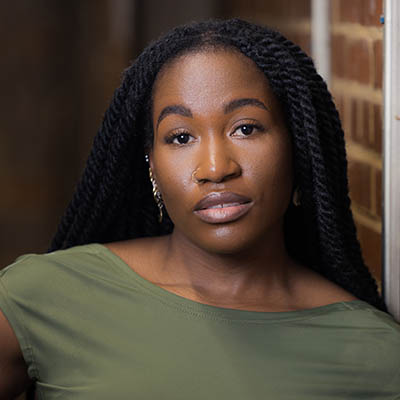
Black Feminism, Performance and Power: An Interview with Hope Ward
Written by Frances Burson
Hope Ward is a third-year PhD student in the Media, Art, and Text (MATX) program, an interdisciplinary doctoral program that is a joint endeavor of the Department of English, the School of the Arts and the Robertson School of Media and Culture. Before enrolling at VCU, Ward earned an MFA in theater from Columbia University and a BA in theater from Randolph-Macon, with triple minors in music, women's studies, and Black studies.
Ward defines herself as “an artist emphasizing the synonymic role of Black feminism and universal humanity.” She believes “the trauma that shapes the Black experience in this country lays so heavy on the average Black American, that often performance exists as the only passageway through to power.”
In addition to her academic successes, Ward is also an accomplished actor, choreo-poet, and director. Her most recent performing credits include Antigone in Baltimore Center Stage’s Production of “Antigone,” and Tyree in the Off-Broadway Production of “Bundle of Sticks” at Intar Theater. She has appeared in the Amazon Prime videos “Love My Roomie” and “Hawks Ridge” as well as HBO’s “Succession.” Her original play, “To All the Black Girl’s Who’ve Waited,” recently had its off-Broadway debut at Ars Nova’s ANT Fest in June 2023.
Ward’s research combines her scholarly and artistic expertise in a project titled, "Imagine Being Free: Decolonizing Actor Training in University and Conservatory Programs." In her own words, this research aims to "demonstrate how the anti-black ancestry of American theater, exhibited in the auction block, blackface minstrelsy and current viewing practices of Black performers, has had a lasting influence on MFA, BFA and conservatory acting technique programs." She is looking at the three main actor training techniques 1) Voice for the Actor, 2) Character Analysis, and 3) Speech and Dialect in order to demonstrate their reliance on white normativity as a training technique.
This academic year, Ward is serving as a graduate research assistant at the Humanities Research Center, so we caught up with her to ask her to delve deeper into her work.
Why did you choose this particular thesis to focus your research on?
I chose this research area because there is a need for fundamental change in our teaching methods in acting technique. And because of how deeply our current acting methods are negatively affecting how Black Americans are viewed in entertainment media.
How has your career as a performer and an artist informed your scholarly work?
My career as a performer directly informs my scholarly work. My experience in a graduate acting program and then in the professional industry of acting showed me just how much the two rely on each other. When you are told the excuse for the racist, sexist and homophobic nature of acting technique programs is to help you prepare for the world, once in the world you begin to realize that the bigotry in our industry is actually indoctrinated via our education programs.
My work as a performer is fundamental in my scholarly work because it is art which pushes the world forward and it is art which pushes me forward.
Can you talk more about how “performance is a passageway to power,” especially as it relates to Black Americans?
Performance’s role in black Americans lives is twofold; it is what many black folk have to use to survive in our day to day lives, and it is simultaneously a form of art which evokes the most natural orients of freedom. Performance in its most free form gives the body back to black and black back to the body. It allows for the black body to be so loyal to itself that it can always find joy despite the foulness of the world.
Ultimately, what would you like the impact of your work to be?
I would like my new fundamentals of acting technique to be adopted into MFA, BFA and conservatory programs across the United States.